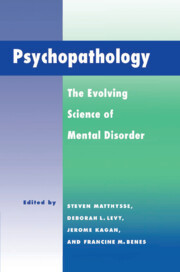26 - Reflections on the developing science of psychopathology
Published online by Cambridge University Press: 04 May 2010
Summary
“O, Wonder!
How many goodly creatures are there here!
How beauteous mankind is! O brave new world
That has such people in't!”
Miranda, in The Tempest, Act V, Scene iTo paraphrase the awestruck Miranda, at the conclusion of The Tempest, “O brave new world, that has such insights in't.” How magically different is the contemporary landscape of this evolving science of psychopathology from the one I came upon in 1946 when I began my graduate training. And yet, to pull another quotation from that last great play of Shakespeare's, “What's past is prologue.” It therefore may be instructive to cast a backward eye to that earlier period not only to savor the extraordinary leaps we have made, but also to temper a bit the celebration of our successes by grasping whatever lessons there are to be learned from our history.
It has been observed by Boring (1950), a particularly astute commentator on the history of psychological science, that new theories (and I will add new discoveries or sciences) do not flash upon the scene already formed. In almost every case of a new good idea, it is possible to trace its roots to earlier ideas. Such historical precedence does not detract one bit from the merit of the new idea, but it does pose the question of why that new idea blossomed now and not earlier.
- Type
- Chapter
- Information
- PsychopathologyThe Evolving Science of Mental Disorder, pp. 583 - 606Publisher: Cambridge University PressPrint publication year: 1996



